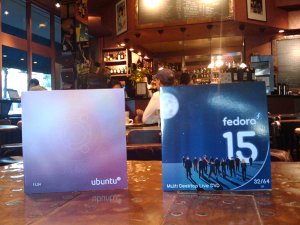On the Internet groups can form around many different interests. Each software application one uses is developed by a group of people. Sharing code is an overwhelming advantage of using Free Software and open source software. Scratching one’s own itch is the common shared interest.

Members of our group are active in other world-wide groups such as the Ubuntu Community, Fedora Ambassadors and OpenSUSE Advocates.
If you are particularly interested in learning more about an application our members have worked in all aspects of the software engineering development lifecycle using different models and can provide guidance. While some people still believe that coding is magic there are many other ways that people can contribute to a project. There are many valuable contributions to software projects other than code like writing documentation, testing the code and/or helping manage reports of problems, aka. bugs.
A well written issue/defect/problem/change request/bug report is extremely valuable. Users that look and find no documentation are usually quite disappointed. Coders sometimes overlook this real need.
Widespread use of a program often leads to the need for i18n and l10n or preparing the program for translations (aka i18n or internationalization) and providing the local translation strings (aka l10n or localization).
People are often unaware that several different groups of people usually work together to provide software. Free Software and open source software is commonly distributed through a GNU/Linux Distribution that provides packaging. To make a full system function all the parts (the Linux kernel, often the GNU C Library and many other parts) must function harmoniously together as a system, be installed correctly, provide defaults and instructions for configuration, be upgraded correctly and (when required) be removed correctly. Packagers provide the necessary and important work that is specific to the distribution you are using. Sometimes packaging is provided by the people developing the software but often someone else more closely associated with the distribution handles packaging and additional bug reports.
User Group Advice
People are people, regardless of topic. Linux user groups like ours all require a level of activity to maintain themselves. Rick Moen has done a great job maintaining a HOWTO. Promotion in different ways such as state groups like ubuntu-us-ca, meetup.com, linux.com or interlug can help. About four people, a website, a mail list and a meeting location are about all it takes.
